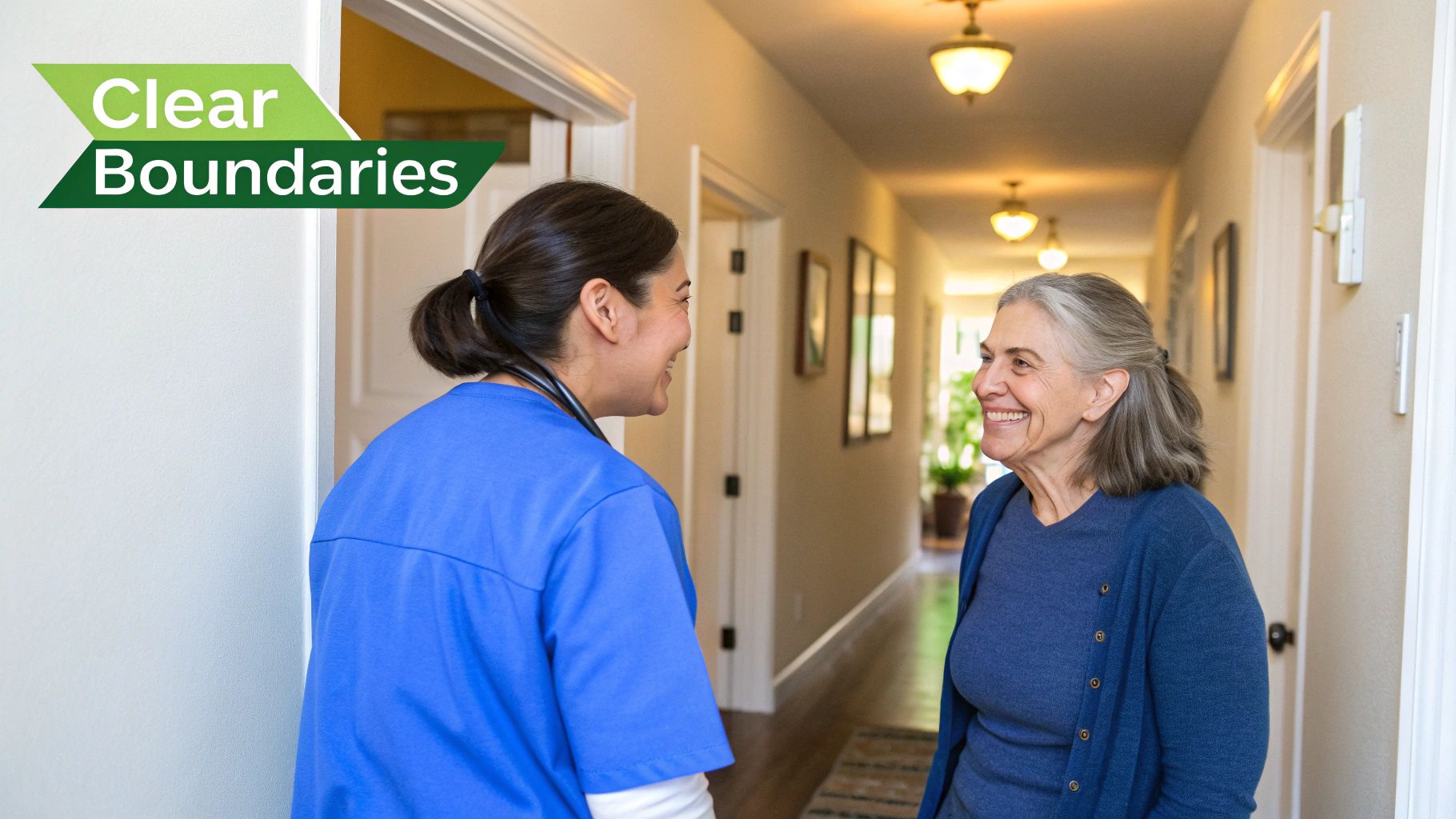The foundation of exceptional home care lies in the quality, compassion, and professionalism of its caregivers. For agencies and families, the interview process is the most critical step in building a trustworthy team. For aspiring caregivers, it's the opportunity to demonstrate their passion and competence. A successful interview goes beyond just verifying experience; it’s about ensuring a perfect match in personality, ethics, and situational judgment.
This guide delves into the most essential home care interview questions designed to uncover the most capable and dedicated professionals. Understanding these questions is crucial for both sides of the table. Hiring managers can use them to identify candidates who possess the right blend of skill and empathy. Job seekers can prepare thoughtful, authentic responses that showcase their suitability for such a vital role.
We will provide a comprehensive breakdown for both employers and candidates, including the 'why' behind each question and what makes a strong answer. We will cover key topics such as handling difficult client behaviors, managing professional boundaries, and responding to emergencies. Whether you're a hiring manager seeking top-tier talent or a candidate preparing for your next career step, this curated list will equip you to navigate the interview with confidence and clarity. The goal is to facilitate a perfect match for providing crucial in-home support, ensuring clients receive the safe, respectful, and compassionate care they deserve.
1. Why do you want to work in home care?
This question might seem like a simple icebreaker, but it’s one of the most powerful home care interview questions an employer can ask. It cuts directly to a candidate's core motivation, values, and understanding of the role. For the interviewer, the answer reveals whether the applicant has a genuine passion for caregiving or simply sees it as just another job. It helps differentiate those with a true calling from those who may not be prepared for the unique emotional and physical demands of the profession.

A strong answer goes beyond a generic "I like helping people." It connects personal values and experiences to the specific environment of in-home care. This setting is distinctly different from a hospital or facility; it requires a deep respect for a client’s autonomy, home, and personal routines.
What Employers Are Listening For
When asking this question, hiring managers are probing for specific themes that indicate a candidate is a good fit. They want to see an appreciation for the one-on-one connection that home care fosters, a quality that agencies like Home Instead prioritize. They are also looking for an understanding of what it means to uphold a client’s dignity in their own personal space, a core value for providers such as Comfort Keepers.
Key Insight for Employers: Pay attention to responses that highlight the unique aspects of home care, such as promoting client independence and building deep, trusting relationships. Vague answers may signal a lack of genuine interest or understanding of the role's specific challenges.
How Candidates Can Prepare a Powerful Answer
To stand out, your response should be authentic and specific. Connect your motivation to a personal story or a core belief. Did a personal experience caring for a family member inspire you? Do you thrive in an environment where you can build a meaningful, long-term bond with one person?
Actionable Tips for Candidates:
- Be Specific: Instead of saying you're compassionate, describe a time you showed compassion that made you realize this career was for you.
- Show Understanding: Mention the unique benefits of aging in place and how you want to support that goal for your clients.
- Connect to Your Strengths: Link your desire to work in home care with qualities like patience, reliability, and respect for personal boundaries.
2. How would you handle a client who refuses care or becomes agitated?
This is one of the most critical behavioral home care interview questions because it simulates a high-stakes, real-world scenario. The answer reveals a candidate's problem-solving skills, emotional intelligence, and ability to remain professional under pressure. Caregivers often work alone, so employers need to trust they can de-escalate difficult situations safely and respectfully without immediate supervision. This question separates candidates with theoretical knowledge from those with practical, on-the-ground experience.

A client's refusal or agitation is rarely arbitrary. It can stem from pain, fear, confusion, a loss of control, or cognitive conditions like dementia. A superior response demonstrates an understanding of these potential underlying causes and showcases a strategy focused on empathy and safety rather than force or frustration. It is a direct test of a candidate’s patience and person-centered care philosophy.
What Employers Are Listening For
Hiring managers use this question to gauge a candidate's competency in several key areas. Agencies specializing in memory care, for example, will listen for dementia-specific de-escalation techniques, like redirecting or validating feelings. Providers like Senior Helpers may evaluate answers for an understanding of trauma-informed care, recognizing that past experiences can influence a client's behavior. The core assessment is whether the candidate prioritizes the client's dignity and safety above all else.
Key Insight for Employers: Look for a step-by-step approach. A strong candidate won't just say "I'd be patient." They will describe how they would remain calm, try to understand the cause, offer alternatives, and know when to step back and report the situation to a supervisor as per safety protocols.
How Candidates Can Prepare a Powerful Answer
Your goal is to demonstrate a calm, systematic, and empathetic approach. Structure your answer to show you can assess, act, and communicate effectively. Avoid saying you would argue with the client or force them to accept care. Instead, focus on preserving their autonomy and trust.
Actionable Tips for Candidates:
- Outline Your Steps: Start by stating you would remain calm and ensure immediate safety. Then, describe how you would try to identify the trigger. For example, "First, I would take a deep breath and ensure the environment is safe. Then, I would gently ask, 'It seems like you're upset. Can you tell me what's on your mind?'"
- Emphasize Client Choice: Show respect for their autonomy. Mention offering alternatives, such as, "If you don't want to shower now, perhaps we could try again after breakfast?"
- Know When to Get Help: A crucial part of a strong answer is recognizing your limits. Explain that if the client's refusal puts them at risk or if agitation escalates, you would follow company protocol to contact your supervisor or, in an emergency, call for medical assistance.
3. Describe your experience with activities of daily living (ADLs)
This is one of the most critical technical home care interview questions because it moves beyond personality and motivation to assess a candidate's hands-on competency. Activities of Daily Living (ADLs) are the fundamental tasks of self-care, and a caregiver's ability to assist with them safely and respectfully is non-negotiable. This question allows employers to gauge a candidate's practical skills and professional knowledge in core areas like bathing, dressing, toileting, transferring, continence, and feeding.
The answer reveals a candidate's level of formal training and real-world experience. It distinguishes those who can theoretically perform a task from those who have practical, nuanced experience. For instance, assisting a client with dementia requires different techniques than helping a post-surgery patient, and a skilled candidate will understand these distinctions.
What Employers Are Listening For
Hiring managers need to hear about more than just a list of tasks. They are assessing a candidate's approach to providing personal care. For example, a rehabilitation-focused agency wants to hear about techniques that promote patient mobility and re-learning, while a hospice provider is listening for an emphasis on comfort and dignity during end-of-life care. They are looking for a deep understanding of safety protocols, infection control, and the importance of preserving a client’s privacy.
Key Insight for Employers: Listen for how candidates talk about the client during these tasks. Do they speak with respect? Do they mention asking for permission, explaining the steps, and ensuring the client feels as comfortable and in control as possible? A focus on client dignity is just as important as technical skill.
How Candidates Can Prepare a Powerful Answer
Avoid simply listing the ADLs you've helped with. Instead, structure your answer to demonstrate your expertise, professionalism, and compassion. Choose one or two specific examples that showcase your skills in a real-world scenario. Talk about not just what you did, but how you did it, emphasizing client safety and dignity throughout the process.
Actionable Tips for Candidates:
- Detail Your Process: Instead of saying, "I have experience with bathing," describe your method: "When assisting with bathing, I always start by ensuring the bathroom is warm and all supplies are within reach to maintain the client's comfort and privacy. I test the water temperature and explain each step to the client before proceeding."
- Mention Adaptive Equipment: If you have experience with tools like Hoyer lifts, slide boards, shower chairs, or adaptive utensils, be sure to mention them. This demonstrates a higher level of skill and adaptability.
- Emphasize Dignity and Respect: Always frame your experience in the context of respecting the client's autonomy and privacy. Explain how you ensure they feel in control and comfortable during what can be vulnerable moments.
4. How do you maintain professional boundaries while building rapport with clients?
This is one of the most sophisticated home care interview questions because it tests a candidate’s understanding of the professional ethics at the heart of caregiving. The role requires building a warm, trusting rapport with clients, yet it also demands a firm line between a friendly relationship and a professional one. Interviewers use this question to gauge a candidate's maturity, professionalism, and ability to navigate the complex social dynamics inherent in entering a client’s personal home and life.

An answer to this question reveals a candidate's foresight and their grasp of potential challenges. It shows whether they have considered situations like being offered gifts, being asked for personal favors, or becoming overly involved in family dynamics. Maintaining these boundaries is critical for the emotional safety of both the caregiver and the client, preventing burnout and ensuring the relationship remains therapeutic and supportive.
What Employers Are Listening For
Hiring managers are looking for signs of professional discipline and ethical awareness. They want to hear that a candidate understands agency policies regarding things like gift-giving and sharing personal contact information. For providers like those serving veterans, maintaining a respectful yet clear boundary is paramount to the integrity of the service. Similarly, in pediatric home care, navigating boundaries with the entire family is a key skill.
Key Insight for Employers: A strong candidate will talk about their approach in terms of respect, confidentiality, and reliability. They should be able to articulate how they can be warm and empathetic without crossing into a personal friendship that could compromise care or create a conflict of interest.
How Candidates Can Prepare a Powerful Answer
Your response should demonstrate a clear understanding of what professional boundaries are and why they matter. Prepare to discuss how you would handle specific scenarios, showing that you can be friendly and compassionate while upholding your professional responsibilities. It’s about being with the client, not becoming one of the family.
Actionable Tips for Candidates:
- Define Your Role: Explain that your primary role is to provide care based on the client's care plan. You are there as a professional supporter, not a personal friend.
- Use Scenario-Based Language: Describe how you would politely decline a gift by explaining it's against agency policy but that you appreciate the thought. Or, explain how you would redirect overly personal questions back to the client’s needs.
- Emphasize Communication: Mention the importance of clear communication with both the client and the agency supervisor. If a boundary issue arises, you should know to document it and seek guidance.
5. What would you do if you noticed signs of abuse or neglect?
This is one of the most critical home care interview questions an employer can pose. The answer reveals a candidate's understanding of their legal and ethical obligations, their observational skills, and their commitment to client safety. Home care professionals are often the primary observers in a client's life, placing them in a unique position to identify and report potential harm. The response to this question is non-negotiable; it's a direct measure of a candidate's fitness to care for a vulnerable person.
For an agency, a caregiver who fails to recognize or act on signs of abuse presents a massive liability and a failure of their core mission. This question tests for knowledge of mandatory reporting laws and the ability to act decisively and correctly under pressure. It separates candidates who understand their role as a client advocate from those who might hesitate or avoid conflict.
What Employers Are Listening For
Hiring managers need to hear a clear, confident, and procedure-driven answer. They are looking for an immediate recognition that any suspicion of abuse or neglect requires action, not just observation. An ideal response involves a two-step process: immediate reporting to a supervisor within the agency and, if necessary, to the appropriate state authorities like Adult Protective Services (APS).
Employers are also gauging a candidate's ability to differentiate between various forms of abuse, including physical, emotional, sexual, financial exploitation, and neglect. A nuanced answer might mention the importance of detailed, objective documentation of any observations.
Key Insight for Employers: The candidate’s response must prioritize the client's safety above all else, including any loyalty to family members or fear of confrontation. A strong answer will demonstrate an understanding of protocol and a commitment to advocacy. Hesitation or a desire to "handle it themselves" is a significant red flag.
How Candidates Can Prepare a Powerful Answer
Your response must be direct and demonstrate a clear understanding of your duty as a mandated reporter. Show that you know the proper channels and would not attempt to investigate or confront the situation on your own, which could escalate the danger or compromise an official investigation.
Actionable Tips for Candidates:
- State the Protocol: Immediately say you would document your specific, objective observations (e.g., "unexplained bruises," "client seemed fearful of a family member," "lack of food in the home") and report them to your direct supervisor or agency nurse immediately.
- Mention Official Channels: Show you are aware of external bodies by mentioning that you understand the agency would then report to Adult Protective Services or the relevant state authority.
- Emphasize Objectivity: Explain that you would report only the facts you observed, without making accusations or assumptions. For example, say "I noticed…" rather than "I think they are being abused." This shows professionalism and an understanding of the reporting process.
6. How do you handle medical emergencies or health changes?
This is one of the most critical home care interview questions an employer can ask. It directly assesses a candidate's practical skills, judgment, and ability to remain calm and effective under extreme pressure. A caregiver's response to an emergency can be the difference between a positive outcome and a tragic one. For the interviewer, the answer demonstrates a candidate's understanding of safety protocols, their role within the care team, and their capacity to protect the client's well-being.

A strong response will showcase a clear, logical thought process that prioritizes the client's immediate safety while adhering to agency policy and legal boundaries. It’s not just about knowing to call 911; it's about understanding the entire chain of communication and action required during and after a crisis. For instance, a caregiver in cardiac rehabilitation home care must know chest pain protocols, while one assisting with diabetes management needs to recognize signs of a blood sugar emergency.
What Employers Are Listening For
When asking this question, hiring managers want to confirm that a candidate can act responsibly and systematically. They are listening for a clear protocol: assess the situation, ensure safety, contact emergency services, and then notify the agency and family. Companies that provide specialized care, like post-surgical care, need to know that caregivers can identify specific warning signs, such as wound infections or breathing difficulties, and follow the correct escalation procedure.
Key Insight for Employers: A candidate who immediately mentions calling 911 demonstrates a correct first instinct. However, a superior candidate will also articulate the importance of notifying the agency supervisor promptly and documenting the incident thoroughly, showcasing professionalism and an understanding of their full responsibilities.
How Candidates Can Prepare a Powerful Answer
Your response should be structured as a step-by-step plan. This shows you can think clearly under pressure and won't panic in a real emergency. Ground your answer in official training like first aid and CPR, and emphasize your commitment to following the client's care plan and the agency's specific emergency procedures.
Actionable Tips for Candidates:
- Outline a Clear Protocol: Start by stating you would first assess the client's immediate safety and call 911 if necessary.
- Emphasize Communication: Follow up by explaining you would immediately contact your supervisor at the agency to report the situation, and then notify the family as directed by the care plan.
- Show Vigilance: Mention your role in observing and reporting subtle health changes, which can help prevent emergencies before they happen.
- Reference Your Training: Briefly state your qualifications, such as being certified in CPR and First Aid, to reinforce your preparedness.
7. Describe a time when you had to work with a difficult family member
This behavioral question is a crucial test of a caregiver's professional maturity and communication skills. Unlike other healthcare settings, home care places the professional directly within complex family dynamics. The interviewer uses this question to gauge a candidate's ability to navigate disagreements, manage stress, and maintain focus on the client's well-being, even when faced with pressure from concerned, and sometimes distressed, family members.
How a candidate answers reveals their capacity for empathy, diplomacy, and professional boundary-setting. It’s one of the most practical home care interview questions because it simulates a real-world challenge that nearly every caregiver will encounter. The goal is to find someone who can act as a calming, professional presence who de-escalates conflict rather than contributing to it.
What Employers Are Listening For
Hiring managers are looking for a response that demonstrates a specific skill set for navigating sensitive situations. They want to hear about your ability to listen actively, show empathy for the family's perspective without compromising the client's care plan, and communicate clearly and respectfully. They are evaluating whether you can uphold professional standards while being a compassionate partner to the entire family unit.
An ideal answer shows an understanding that family members are often acting out of love, fear, or burnout. For instance, in hospice situations, families are grieving, while in long-term care scenarios, they may be exhausted from being the primary caregiver. An ability to recognize and validate these underlying emotions is a sign of a truly exceptional caregiver.
Key Insight for Employers: Listen for answers that prioritize the client's needs and stated wishes above all else. A candidate who can diplomatically redirect a conversation back to the established care plan, while acknowledging a family member's concerns, is invaluable.
How Candidates Can Prepare a Powerful Answer
Prepare a specific story using the STAR method (Situation, Task, Action, Result) to structure your response. This framework helps you deliver a clear, concise, and impactful answer that showcases your problem-solving abilities without sounding critical of the family involved.
Focus on your actions and the positive outcome. The goal is not to complain about a difficult person but to demonstrate how you professionally managed a challenging interpersonal dynamic. Show that you are a collaborative problem-solver, not just a task-doer.
Actionable Tips for Candidates:
- Emphasize Empathy: Start by acknowledging the family member's stress or concern. For example, "The client's daughter was worried her mother wasn't eating enough, which I understood came from a place of love."
- Detail Your Professional Actions: Clearly state what you did. Did you schedule a meeting? Did you provide detailed notes to reassure them? Did you involve your agency supervisor for guidance?
- Focus on the Resolution: Explain how your actions improved the situation. The ideal outcome is a strengthened relationship, reduced family anxiety, and consistent, high-quality care for the client.
8. What is your availability and how do you handle scheduling changes?
This is one of the most practical home care interview questions an employer can ask, as it directly addresses the operational realities of the job. Home care is not a standard 9-to-5 profession; client needs can change unexpectedly, emergencies happen, and flexibility is non-negotiable. An interviewer uses this question to gauge a candidate's reliability, organizational skills, and understanding of the dynamic nature of caregiving schedules.
A caregiver's availability is the backbone of consistent, high-quality care. A candidate who is rigid or unprepared for last-minute adjustments can disrupt client routines and strain agency resources. The ability to adapt to scheduling changes demonstrates professionalism and a commitment to the client’s well-being above all else.
What Employers Are Listening For
Hiring managers need to build a reliable team capable of meeting diverse client needs, from 24-hour care to occasional respite services. They are listening for honesty, a clear communication style, and a realistic understanding of one's own limits. For instance, agencies that specialize in post-hospitalization care need caregivers who can start a case on short notice, while others might need solid weekend and holiday coverage.
Key Insight for Employers: Look for candidates who are not just available but also proactive. A great response includes how they manage their time and communicate potential conflicts in advance. This forethought is a strong indicator of a reliable and responsible team member.
How Candidates Can Prepare a Powerful Answer
Be prepared to discuss your availability with specifics and honesty. It's better to be upfront about your limitations than to overpromise and underdeliver. Frame your flexibility as a strength and show that you understand why it's so critical in a home care setting.
Actionable Tips for Candidates:
- Be Clear and Honest: State your available days, hours, and any recurring commitments you have. Mention your willingness to work weekends or holidays if applicable.
- Demonstrate Adaptability: Explain how you handle unexpected changes. You might say, "I keep my schedule organized and always try to communicate as far in advance as possible if a conflict arises. I understand that client needs can change, and I'm flexible in adjusting my schedule to help when I can."
- Confirm Your Logistics: Mention your reliable transportation and the geographic areas you are willing to travel to, as this directly impacts your ability to cover shifts effectively.
Home Care Interview Questions Comparison Guide
| Question / Aspect | Implementation Complexity 🔄 | Resource Requirements ⚡ | Expected Outcomes 📊 | Ideal Use Cases 💡 | Key Advantages ⭐ |
|---|---|---|---|---|---|
| Why do you want to work in home care? | Low – simple interview question | Minimal – requires interviewer judgment | Understands motivation, values, and long-term fit | Initial screening to assess passion and retention | Identifies genuine caregivers, predicts satisfaction |
| How would you handle a client who refuses care or becomes agitated? | Medium – requires behavioral interview skills | Moderate – interviewer experience needed | Evaluates conflict resolution and emotional intelligence | High-stress environments needing de-escalation skills | Predicts real-world handling of difficult situations |
| Describe your experience with activities of daily living (ADLs) | Medium – technical knowledge assessment | Moderate – interview plus possible demonstrations | Confirms hands-on caregiving skills | Roles requiring direct personal care | Assesses practical experience and safe care delivery |
| How do you maintain professional boundaries while building rapport with clients? | Medium – requires nuanced evaluation | Moderate – interviewer skill in interpretation | Ensures ethical care and professional relationships | Settings with close client-caregiver relationships | Prevents boundary violations, promotes professionalism |
| What would you do if you noticed signs of abuse or neglect? | Medium – knowledge-based, critical for safety | Moderate – requires interviewer awareness | Ensures client protection and legal compliance | Vulnerable populations requiring mandatory reporting | Identifies ethical candidates, reduces liability |
| How do you handle medical emergencies or health changes? | High – technical and situational knowledge needed | High – may require medical background or training | Confirms emergency readiness and appropriate response | Medical or high-risk home care cases | Ensures rapid, correct emergency actions |
| Describe a time when you had to work with a difficult family member | Medium – behavioral, interpersonal skill focus | Moderate – interview skill in behavior analysis | Assesses diplomacy and family communication capability | Family-centered care settings | Predicts success managing complex family dynamics |
| What is your availability and how do you handle scheduling changes? | Low – practical and straightforward | Low – interviewer simply records answers | Assures scheduling flexibility and reliability | Agencies with irregular hours and urgent coverage | Ensures dependable, flexible caregiving availability |
Building Your Team, Advancing Your Career
The journey to finding the right caregiver or the ideal home care position is paved with meaningful conversations. The interview process is far more than a simple formality; it's the critical juncture where values, skills, and personalities align to form the foundation of trust. Mastering the art of asking and answering the right home care interview questions is the key to unlocking successful, long-term care relationships that benefit everyone involved.
For hiring managers and home care agency leaders, this guide has armed you with a strategic framework. Moving beyond basic inquiries about experience allows you to build a team that is not just skilled, but also resilient, empathetic, and deeply aligned with your mission. The situational, behavioral, and ethical questions we've explored are your tools for identifying individuals who possess the compassion and critical thinking necessary to handle the dynamic, personal nature of in-home care.
For aspiring and current caregivers, preparing for these questions is an investment in your professional development. It encourages you to reflect on your experiences, articulate your philosophy of care, and showcase your unique strengths. Your thoughtful, experience-backed answers to questions about handling difficult clients, maintaining boundaries, and responding to emergencies demonstrate more than competence. They reveal your character, your dedication, and your profound understanding of what it truly means to care for another human being with dignity and respect.
Key Takeaways for Lasting Success
To truly elevate your next interview, whether you are conducting it or participating in it, remember these core principles:
- Beyond the Resume: Skills are vital, but a candidate's character, problem-solving ability, and ethical compass are what sustain quality care. Focus questions on how a candidate would act, not just what they have done.
- Empathy is Non-Negotiable: The best caregivers connect on a human level. Look for answers that reflect a genuine understanding of the client's emotional and physical state, from handling agitation to celebrating small victories.
- Safety and Boundaries are Paramount: A professional caregiver knows how to be warm and friendly while maintaining the professional line. Probe for a clear understanding of protocols for emergencies, reporting abuse, and managing difficult family dynamics.
- Communication is the Core: Every question, from scheduling flexibility to handling a client who refuses care, is ultimately a test of communication. Great caregivers are great communicators, capable of listening, de-escalating, and clearly conveying information.
A Final Thought: The quality of home care is a direct reflection of the quality of the people providing it. By engaging in a more thoughtful, in-depth interview process, we are not just filling a role or finding a job. We are actively building a stronger, safer, and more compassionate support system for our community's most vulnerable members. Each well-asked question and well-considered answer is a step toward enhancing lives, fostering independence, and ensuring that every client receives the exceptional care they deserve. Use these insights to make your next interview a powerful and productive step in that vital mission.
Are you a compassionate professional seeking a fulfilling career in home care, or a family in New Jersey looking for an agency that prioritizes quality and character? At NJ Caregiving, we believe that asking the right home care interview questions is the first step to building exceptional care teams. Explore our career opportunities or learn about our services to see how our commitment to excellence can support you.



